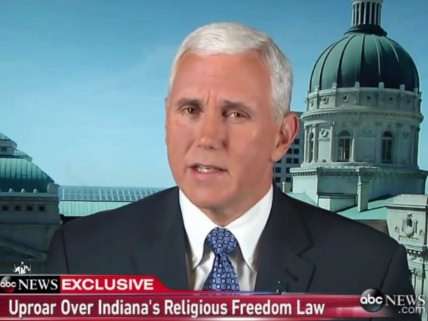Amendment to Indiana's RFRA Would Eliminate Discrimination Defense for Business Owners
Vendors who object to same-sex marriage could be forced to participate in gay weddings.

Yesterday Indiana Gov. Mike Pence promised to seek legislation clarifying that his state's new Religious Freedom Restoration Act (RFRA) "does not give anyone a license to deny services to gay and lesbian couples." The Indianapolis Star reports that a RFRA amendment Pence is floating says the law "does not authorize a provider—including businesses or individuals—to refuse to offer or provide its services, facilities, goods, or public accommodation to any member of the public based on sexual orientation or gender identity." More precisely, the amendment "would specify that the new religious freedom law cannot be used as a legal defense to discriminate against patrons based on their sexual orientation."
Assuming that gloss accurately reflects the wording of the bill, it would mean that business owners in Indianapolis, Bloomington, and South Bend—the three Indiana cities that ban discrimination based on sexual orientation—could not cite their religious objections to same-sex marriage as a defense against complaints prompted by their refusal to participate in gay weddings. Since Indiana does not prohibit discrimination based on sexual orientation, the new language would have no impact on the legality of such refusals elsewhere in the state. Critics of Indiana's RFRA therefore are demanding a statewide ban on such discrimination, which Pence opposes.
In an interview with the Star, Indiana University law professor Steve Sanders notes that the RFRA amendment as reported also would not apply to discrimination in housing or employment:
The prospect of gays and lesbians being denied service by merchants has been the emotional and symbolic center of this debate. But the debate has largely overlooked other activities covered by civil rights laws in various Indiana cities, namely employment and housing….What about employers who fire gays or lesbians for what they claim are religious reasons? Or landlords who refuse to rent to them? Or real estate agents who won't take them on as clients? If this legislative fix isn't broad enough to exempt all aspects of civil rights law from the RFRA, people in those lines of business would still be able to use RFRA as a shield against employment or housing discrimination claims.
According to the Star, the proposed amendment explicitly "exempts churches or other nonprofit religious organizations—including affiliated schools." That provision raises the same question as a similar exemption from Obamacare's contraceptive mandate: If religious objections make exceptions for organizations appropriate, why don't individuals, including business owners, deserve the same accommodation?


Show Comments (85)